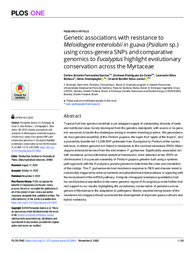Genetic associations with resistance to Meloidogyne enterolobii in guava (Psidium sp.) using cross-genera SNPs and comparative genomics to Eucalyptus highlight evolutionary conservation across the Myrtaceae.
Genetic associations with resistance to Meloidogyne enterolobii in guava (Psidium sp.) using cross-genera SNPs and comparative genomics to Eucalyptus highlight evolutionary conservation across the Myrtaceae.
Author(s): SANTOS, C. A. F.; COSTA, S. R. da; BOITEUX, L. S.; GRATTAPAGLIA, D.; SILVA JUNIOR, O. B. da
Summary: Tropical fruit tree species constitute a yet untapped supply of outstanding diversity of taste and nutritional value, barely developed from the genetics standpoint, with scarce or no genomic resources to tackle the challenges arising in modern breeding practice. We generated a de novo genome assembly of the Psidium guajava, the super fruit “apple of the tropics”, and successfully transferred 14,268 SNP probesets from Eucalyptus to Psidium at the nucleo- tide level, to detect genomic loci linked to resistance to the root knot nematode (RKN) Meloi- dogyne enterolobii derived from the wild relative P. guineense. Significantly associated loci with resistance across alternative analytical frameworks, were detected at two SNPs on chromosome 3 in a pseudo-assembly of Psidium guajava genome built using a syntenic path approach with the Eucalyptus grandis genome to determine the order and orientation of the contigs. The P. guineense-derived resistance response to RKN and disease onset is conceivably triggered by mineral nutrients and phytohormone homeostasis or signaling with the involvement of the miRNA pathway. Hotspots of mapped resistance quantitative trait loci and functional annotation in the same genomic region of Eucalyptus provide further indirect support to our results, highlighting the evolutionary conservation of genomes across genera of Myrtaceae in the adaptation to pathogens. Marker assisted introgression of the resistance loci mapped should accelerate the development of improved guava cultivars and hybrid rootstocks.
Publication year: 2022
Types of publication: Journal article
Unit: Embrapa Semi-arid Region
Observation
Some of Embrapa's publications are published as ePub files. To read them, use or download one of the following free software options to your computer or mobile device. Android: Google Play Books; IOS: iBooks; Windows and Linux: Calibre.
Access other publications
Access the Agricultural Research Database (BDPA) to consult Embrapa's full library collection and records.
Visit Embrapa Bookstore to purchase books and other publications sold by Embrapa.

